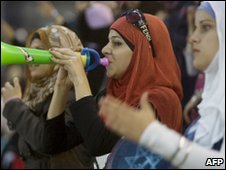 Maan News Agency, December 31, 2009
Maan News Agency, December 31, 2009
Construction on the Al-Bireh stadium resumed last week, a month after the Israeli forces shut-down the project. But Palestinian officials are not celebrating – the mood is tense, and the building feverish, as the fate of the stadium remains uncertain.
Work on the stadium began in October 2008, after the FIFA-financed turf was completed. Building commenced with great fanfare – FIFA President Joseph Blatter helped to lay the stadium’s first stone at the inauguration ceremony.
Blatter also attended the Palestine-Jordan football match at the Al-Husseini Stadium, a landmark meeting as it was Palestine’s first time hosting a team from abroad. The significance of the match was not lost on Blatter, who stated in a press release: “Football is about much more than just kicking a ball. The aim of football is not only to put the ball in the net, but to touch the world and build a better future…”
Speaking of both the Palestine-Jordan match and the Al-Bireh stadium, Hikmat Abu Ras of the Palestinian National Authority’s Ministry of Planning comments, “Sports are like an ambassador. It’s a message to the world—we are here, we have rights like any nation.”
And considering the stadium’s funding – France and Germany are footing the cost of the stands – it seems like the international community is not only listening, but chiming in.
“The stadium is a symbol,” Abu Ras says, “Like when you build a mosque or a church, you feel like you are in a free country, an independent state.” Hosting a foreign team and building a new stadium were steps, however small, towards getting Palestine on its feet, Abu Ras explains.
The momentum came to a screeching halt on 1 November. The Al-Bireh municipality received a stop-work order issued by Israel’s Supreme Planning Council – the same body that green-lighted the stadium almost 30 years ago, according to a report in Israel’s daily newspaper Haaretz. The order also included threats of demolition.
The spokesperson for the office of Coordination of Government Activities in the Territories (COGAT) told Ma’an at the time, that “Construction took place without the necessary permits and contrary to building plans in force at the location, thus prompting enforcement action.
The Civil Administration in Judea and Samaria is working expeditiously with the Palestinian Authority’s General Authority for Civil Affairs out of a desire to resolve the issue. It was decided between both sides that the El-Bireh municipality will submit updated building plans, after which the issuance of a tentative clearance for continued building will be considered.”
In regards to the resumed construction – with has been confirmed by FIFA, the Palestinian National Authority, and the Palestine Football Association – COGAT has no additional comments at this time.
A spokesperson for FIFA said, “The President of the Palestine FA attended a meeting this Monday (21 December) at FIFA in Zürich to discuss this topic. The stadium project is based in Zone A [Area A], and therefore following a period of monitoring, FIFA was informed that this case is now closed, and the project will continue.”
Will it?
According to Haaretz, there has been some debate as to whether the land is situated in Area A, which falls under Palestinian jurisdiction, or Area C, which is subject to Israeli control under the terms of the Oslo Agreement. Despite the fact that the stadium seems to be well within the borders of the Al-Bireh municipality, it may be one link in a chain of Area C islands that, effectively, carve up and cripple Palestine.
Speaking to Haaretz, COGAT called the location of the stadium “illegal.”
But Abu Ras asserts, “Al-Bireh is in Zone A.”
For now, Al-Bireh’s stadium is safe from demolition. And it is getting closer, everyday, to completion. But the case underscores the demoralizing lack of agency felt by both the Palestinian people and government.
“There are no independent decisions for the Palestinian people,” Abu Ras says. “We live under the Israeli shoe.”
From his Ramallah office – which is undecorated save for a framed photo of himself shaking hands with Yasser Arafat, taken some 20 years ago – Abu Ras discusses the stadium and other development as not just a symbol of freedom, but also of continued occupation.
“We have to build a state,” he says. “This state needs security, a strong economy, and infrastructure.”
And despite “a small and weak financial situation” Ramallah is expanding, Abu Ras says. But, as in the case of the stadium, “the occupation will put obstacles in front of any development.”
*Photo by AFP